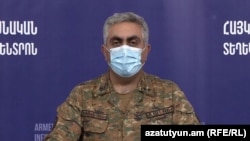Artsrun Hovannisian, who holds a high-level position at Armenia’s main military academy and is known as a supporter of Prime Minister Nikol Pashinian, made the claims in a May 9 interview with state television timed to coincide with the 80th anniversary of the Soviet victory in the war.
Hovannisian described as a “myth” Armenian and Russian historians’ dominant view that Turkey would have invaded Soviet Armenia and liquidated it had the Germans prevailed in the 1942-1943 Battle of Stalingrad. He said Adolf Hitler’s army itself would have occupied not only the entire South Caucasus but also eastern Turkey and restored a “united and historical Armenia.”
Armenian Nazi collaborators hoped to facilitate the realization of that “program,” said Hovannisian. He offered no documentary proof of his claims that caused outrage among Armenian opposition politicians and historians.
Speaking in the Armenian parliament on Monday, a senior lawmaker from the main opposition Hayastan alliance, Artsvik Minasian, accused Hovannisian of “distorting the whole history.” Minasian demanded a criminal investigation into the scandalous comments which he said are designed to “justify Nazi Germany and Hitler's regime that committed crimes against humanity.”
Russian Ambassador Sergei Kopyrkin added his voice to the condemnations in an open letter to Armenian Defense Minister Suren Papikian. He said Hovannisian’s “historically false and blasphemous statements” are an attempt to “desecrate the memory of our heroic ancestors.”
“It was especially painful to hear such statements from a person who currently heads the Command and Staff Institute of the Military Academy of the Armenian Ministry of Defense, which bears the name of a famous commander of the Great Patriotic War, twice Hero of the Soviet Union Marshal [Ivan] Bagramyan,” said Kopyrkin.
Hovannisian earned notoriety in Armenia during the 2020 war with Azerbaijan when he worked as Defense Ministry spokesman and held news briefings on a virtually daily basis. He for weeks denied serious territorial losses and other military setbacks suffered by Armenian forces. The scale of those losses became known only after the six-week hostilities were stopped by a Russian-brokered ceasefire.
Nevertheless, Hovannisian was subsequently promoted to the rank of colonel and appointed to his current post. Unlike other senior military officials, he has openly supported and promoted Pashinian’s policies on social media.
The Armenian government has not publicly commented on Hovannisian’s comments aired just hours after Pashinian attended a Russian military parade in Moscow devoted to the Soviet victory anniversary. Opposition leaders as well as pundits critical of the government believe that the comments were ordered by Pashinian as part of his efforts weaken Russian presence in Armenia and reorient his country towards the West.
The Second World War victory anniversary has remained a public holiday in Armenia since the breakup of the Soviet Union. Some 320,000 residents of Soviet Armenia, then a republic of just 1.3 million people, were drafted to the Soviet army during the bloodiest war in the history of humankind. The total number of its ethnic Armenian participants from various Soviet republics is estimated at more than 500,000. About half of them were killed in action.
More than 100 Armenian soldiers of the Red Army received the highest state award, the title of Hero of the Soviet Union.






